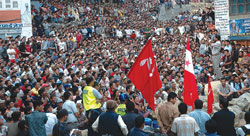|
|
| IMAGE BUILDING: A peaceful poetry recitation in Kirtipur by students during Jana Andolan II gave a hopeful message about the situation in Nepal to the rest of the world. |
Washington DC - At a conference here, attended by people from over a hundred countries, the Beed was asked the same questions repeatedly. How the 'civil war' situation in Nepal is, and whether the Maoists are taking over the country.
Now these people are clearly not ignorant about Nepal's recent history. What they are is ill-educated. Can't blame them. After all, look at the primary sources of information out there-the Indian papers, the websites and wire services give the impression of continuous disturbance in Nepal, and the US has issued another travel advisory.
There are no good stories out there, because we haven't been telling them effectively. Why aren't we letting the world know how, since April last year, we've been undergoing a transition few countries in the world have managed. The former rebels are in government, and the fate of an over 200 year-old institution, the monarchy, awaits decision by a constituent assembly. Also in this short time we've agreed on federalism in principle, and communities that have been excluded for decades are finally being allowed a voice. People are travelling freely within their own country. It's hard to get a seat on a plane coming into Nepal. Public offerings of shares are over-subscribed, the stock exchange index is climbing, and people are thinking about investing again. And virtually all these developments are homegrown, the result of Nepali efforts.
It's true enough that the business of media thrives on sensationalism, but who says we just have to sit quiet, resigned to our fate? There are any number of strategies we can cobble together to build a positive communication strategy for Nepal. There are ways to counter the impact of what the Beed likes to call 'Thursday columnists'-reporters who translate the gossip in the midweek tabloids and file them as legitimate stories on the international wires. We may be used to reading such speculative, mud-slinging pieces, but what do you think the world makes of them? Especially when that is all they read, and almost nothing on our successes, such as how the emphasis on education for girl children has led directly a 50 percent increase in the number of girls appearing for SLC in the last few years.
The failure of the government of Nepal to appoint ambassadors is unpardonable. But our diaspora isn't doing very much for the motherland either. The talk is still about problems rather than solutions. It seems that, as Nepalis become more upwardly mobile, they get more and more cynical about Nepal. One bidesi Nepali recently admitted as much, saying "it doesn't really matter what happens in Nepal, Nepal-bashing is a habit."
All these reasons are why we need, in whatever capacity we can, to tell our stories and tell them well. The old shangri-la story was tired enough. Do we really want to be saddled with little more than a 'shangri-la gone sour' image-the royal massacre and the Maoists, relieved only by Everest. It's incredible how much more you can do, if you have some control over how you are perceived.




